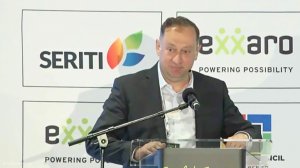JOHANNESBURG (miningweekly.com) – China generates more electricity than the US, India and the EU put together, Menar MD Vuslat Bayoglu told Wednesday’s Coal & Energy Transition Day, where he added “… and I think this race is already won by China”.
This is taking place at a time when electricity generation from coal is at an all-time high, amid the rise of carbon capture, utilisation and storage (CCUS) technologies paving the way for coal-firing to be done more sustainably, Bayoglu highlighted at the event chaired by mining luminary Bernard Swanepoel. (Also watch attached Creamer Media video.)
By the end of 2022, 65 CCUS projects were operating globally, capturing nearly 41-million tons of CO2 a year, Bayoglu noted, with another 478 projects in development. If completed, global CCUS capacity could reach 623-million tons annually by 2030.
“CCUS is the key tool for decarbonisation, and this is applicable for South Africa,” Bayoglu said.
A video clip aired, showed former Google CEO Emerson Schmidt emphasising the need for energy in all forms needing to be made available quickly amid major data centre expansion.
“People are planning 10 GW data centres just to do the translation, an average nuclear power plant in the United States is one gigawatt. How many nuclear power plants can we make in one year where we're planning? Many people think that the demand in energy part that our industry takes will go from 3% to 99% total generation,” the clip showed the former Google CEO as saying.
“One of the estimates that I think is most likely is that data centres will require an additional 29 GW of power by 2027 and 67 more gigawatts by 2030, That gives you a sense of the scale that we're talking about. These things are industrial at a scale I’ve never seen in my life,” Schmidt remarked.
According to a US Energy Department report, blackouts in the US could increase 100 times in the next five years as a result of the electricity demand of AI data centres.
Baseload power is described as being crucial to AI infrastructure owing to the slightest interruption in power potentially causing costly delays and loss of data.
“We have to accept that we need all forms of energy, and when we need all these forms of energy, we just need to make sure that we use the right technologies to ensure that the decarbonisation happens, so that we don't actually pollute the world,” Bayoglu emphasised at the well-attended event covered by Mining Weekly.
Earlier he drew attention to the prospect of AI erasing repetitive and routine jobs and spoke of AI requiring large computing resources that generate heat. As a result, thought is being given to taking AI systems into space because of the cooling challenges that they present on earth.
An AI data centre can, he pointed out, have a capacity of 100 MW or more and can consume as much electricity annually as 100 000 households.
EMAIL THIS ARTICLE SAVE THIS ARTICLE ARTICLE ENQUIRY FEEDBACK
To subscribe email subscriptions@creamermedia.co.za or click here
To advertise email advertising@creamermedia.co.za or click here










